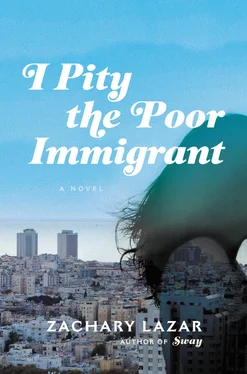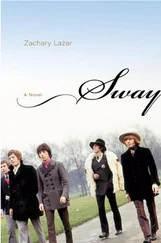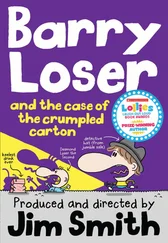“I went to South Tel Aviv,” she told me. “Those places you wrote about where Bellen came from — Hatikva, Etzel Street. I knew enough to know that that’s where I should go. There was a cook I worked with at the hotel and he brought me — we took the bus that first time, it was a weekday, before our shift. Even back then, it was like you describe. Coffee for the men. For me, nothing. Coffee in those little gold-rimmed cups. I had to go back three or four times — it was just luck finally that got me anywhere. Luck. They wouldn’t have told me a word if I hadn’t recognized one of them. He’d been the driver of the man I told you about, the American. Because I knew his driver, I could speak to them. I could tell them that I didn’t want the apartment. What I wanted was the next year’s rent and then the apartment was theirs — whoever’s. I had no idea how much the rent was. I just thought one year sounded like a nice round figure.”
She assumed they would say no, or worse, that they’d ask for something back, involve her somehow, but then, after two weeks of silence, the driver appeared one evening at the Dan Hotel. He arranged to meet her the next day at the apartment she’d shared with her mother all those years.
“It was not a full year’s rent,” she told me. “It was more like a few months. But it was enough for an air ticket, with a little left over. It was enough to get me here.”
The waiter cleared our unfinished salads. I told Gila I had to go to the bathroom, but what I really needed was to go inside and sit at the bar and write it down without her watching me. If I don’t write it down, it begins to change. I knew it was changing a little even as I was writing it down. Etzel Street. Hatikva. The names of places she’d seen in my piece. I still didn’t know how much I believed her story. It occurred to me that the whole time I was in Israel, I had never once thought of my old babysitter, Gila Konig.
Gila Konig, born Tsilya Konig, somewhere in Hungary, 1939. Survivor of Bergen-Belsen, survivor of a DP camp outside Munich called Foehrenwald, refugee in the new state of Israel, 1950–1980. In 1980, Gila Konig had come to New York with a few hundred dollars and no connections, thinking she might find work as a designer, or if not as a designer, doing something in the fashion industry. Eventually, with my father’s help, she managed to enter into the dress business, selling wholesale to department stores — Macy’s, Dillard’s, Neiman Marcus — from her own small showroom on Seventh Avenue. And for a brief span early on in this trajectory — for a little more than a year — she had scraped by as a Hebrew school teacher at a temple on the Upper East Side, the congregation my family happened to belong to in the year my mother began dying of cancer.
I noticed that throughout our conversation she had almost never referred to Lansky by name. It was “the man I told you about,” or “the man I knew, the American.” It occurred to me that you could read this two ways. It was either an indication that she was lying and was nervous that her story sounded untrue, or that she was telling the truth and was nervous that her story sounded untrue.
When I returned to the table, she was talking on her cell phone. After she finished, there was a silence as we readjusted to the people we were now, as opposed to the people we’d been all those years ago. She looked away, at the long line of tables to our side, most of them empty. They each had a tiny white vase with a white orchid and a sprig of fern, which in the shade of the porch stood in subtle but dramatic contrast to the white tablecloths.
“I’m lucky I know Hugh,” she said. “I don’t have many people in my life. He’s waiting for me. He’s at the apartment. I’ll finish telling you the story and then we should go.”
She took another sip of water, as if in preparation, and then she told me what I would have guessed a long time ago if I had wanted to think about it. She told me that her affair with my father had started before my mother’s death, not after it. She admitted that from the moment she’d met my father she could see what he would ultimately want. She could see the opening, I suppose you could say, but of course she put it differently. He was “lost” in “grief,” she said. It wasn’t what my father “wanted,” it was what he “needed.” It was “naïve,” she went on, to wish for men to be “better” than they were. I feel somehow prim writing this all down now, inserting these quotation marks. I look at my past and what infuriates me is not my father but the rigid predictability of everything I did in the hopes of getting back at him — my marriage after a promiscuous past, the affair that then broke that marriage up. All of that by my midtwenties. All so that I could for a brief time pretend to be better than my father and then repeat the kind of behavior I held against him. When you’re young, your power is self-destruction. It occurred to me that my being there at that lunch was just a late echo of that self-destruction.
“You’re not angry at me,” Gila said.
“I told you already, it was a long time ago.”
“You haven’t told me what your intentions are. What your interest in all this is.”
“If you’re asking if I want to write about your past, then I don’t have any intentions. I have other things I’m working on right now.”
“I would think there would be money in a story like this, but maybe that’s a little vulgar for you, getting money for something you’re not that interested in, or that wasn’t your idea. I guess I think about money because I wasn’t born into a world like this one, the kind of world you were born into. The kind of world your father was able to give you access to.”
She sat up very straight, her hands placed before her on the table, and looked at me with something like reproach. Perhaps hearing someone’s confession is inherently draining. Its effect at that moment was to prevent me from pressing her to tell me anything more. I knew that’s what she wanted, and to ask would have made me feel I was indulging her, granting her story more interest than I wanted it to have. As I said, I was familiar with people overestimating the specialness of their stories. People imagine movies. They imagine a best seller, not a vanity press book. It’s the way the world is, everywhere, not only in America. You can go through Bergen-Belsen, Foehrenwald, and still be prey to this myth.
I knew I couldn’t write in good faith about Gila’s past with Lansky without writing about her past with my father — perhaps that explains my lack of interest at that lunch. I knew that to write about my father would only be to open up the old wounds, and I’d already done some of that years before in the memoir I’d written about my marriage and its collapse. I was tired of memoirs, I thought, tired of myself. But perhaps I was simply tired of struggling with my father and his opinion of my opinions. Which is to say that it was probably inevitable that I would eventually write about Gila and Lansky, Gila and my father, for I was still angry with my father, even if I didn’t want to be.
The waiter came with the bill. We weren’t friends, so although I offered to help Gila with the check, I didn’t press it when she refused.
“I’ll tell you more the next time,” she said. “When we see each other again. How about that?”
She smiled. She wanted more from me even now. She wanted the waiter to take our photograph. I forced myself to move my chair around the table, closer to Gila’s, my hand on her shoulder, so he could fit us both in the frame.
“Thank you for coming,” she said then, flatly.
Hearing that sudden hardness in her voice, I had a moment of regret. I began to feel that I had judged her too harshly. She took one last look at the photo on her digital camera, then drew back the lens and put it in her purse. We smiled at each other — my smile transparently false — and before saying goodbye I made an equally false promise that we’d see each other again soon.
Читать дальше












